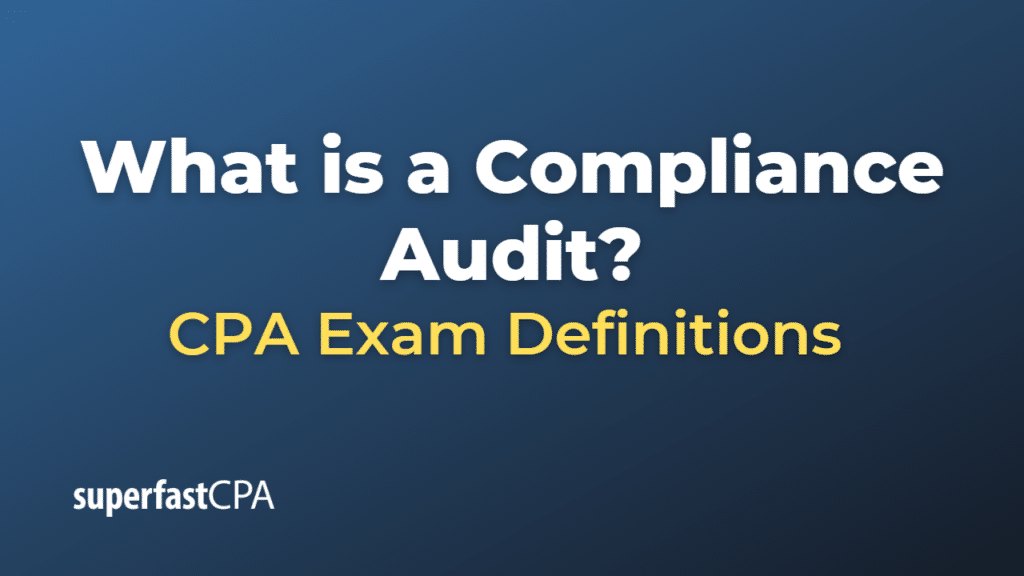Compliance Audit
A compliance audit is a systematic examination or assessment conducted by an independent auditor to determine whether an organization is adhering to the relevant laws, regulations, guidelines, policies, or industry standards that apply to its operations. Compliance audits are crucial for organizations to identify potential areas of non-compliance, minimize risks associated with regulatory violations, and ensure that they operate in a lawful and ethical manner.
The purpose of a compliance audit can vary depending on the nature of the organization and the specific regulations or standards it must follow. Some common types of compliance audits include:
- Financial Compliance Audits: These audits focus on an organization’s adherence to financial reporting standards, such as the Generally Accepted Accounting Principles (GAAP) or International Financial Reporting Standards (IFRS), as well as applicable laws and regulations, like the Sarbanes-Oxley Act for public companies in the United States.
- Environmental Compliance Audits: These audits evaluate an organization’s compliance with environmental laws, regulations, and permits, such as the Clean Air Act, Clean Water Act, or Resource Conservation and Recovery Act.
- Health and Safety Compliance Audits: These audits assess an organization’s adherence to occupational health and safety regulations, such as the Occupational Safety and Health Act (OSHA) in the United States, or the Health and Safety at Work Act in the United Kingdom.
- Information Security Compliance Audits: These audits examine an organization’s compliance with data protection and information security standards, such as the General Data Protection Regulation (GDPR) in the European Union or the Health Insurance Portability and Accountability Act (HIPAA) for healthcare organizations in the United States.
During a compliance audit, the auditor will typically review an organization’s policies, procedures, records, and practices to identify any areas of non-compliance, as well as recommend corrective actions to address these issues. The auditor may also evaluate the organization’s internal controls and risk management processes to ensure they are effective in mitigating compliance risks.
Compliance audits are essential for organizations to maintain their reputation, avoid potential fines and penalties associated with regulatory violations, and ensure that they operate ethically and responsibly within their industry.
Example of a Compliance Audit
Let’s consider a hypothetical example of a pharmaceutical company, PharmaCo, which undergoes a compliance audit to assess its adherence to relevant regulations and industry standards.
PharmaCo is subject to various laws and regulations, such as those enforced by the Food and Drug Administration (FDA) in the United States or the European Medicines Agency (EMA) in the European Union. These regulations govern aspects such as drug development, clinical trials, manufacturing processes, labeling, and marketing practices.
To ensure that PharmaCo is in compliance with these regulations, the company engages an independent auditing firm to conduct a compliance audit. The audit process includes the following steps:
- Planning: The auditors develop an audit plan that outlines the scope, objectives, and methodology of the compliance audit. This plan includes a detailed review of the relevant laws, regulations, and industry standards that apply to PharmaCo’s operations.
- Document Review: The auditors examine PharmaCo’s policies, procedures, manuals, and records to gain an understanding of the company’s internal controls and risk management processes related to regulatory compliance.
- On-Site Inspection: The auditors visit PharmaCo’s facilities to observe the company’s operations, inspect the manufacturing processes, and verify that the company is following the established policies and procedures.
- Interviews: The auditors conduct interviews with key personnel at PharmaCo, such as the quality assurance manager, regulatory affairs manager, and clinical trial coordinator, to gather additional information and insights regarding the company’s compliance efforts.
- Testing: The auditors perform tests on a sample basis to verify that PharmaCo’s practices are in line with the applicable regulations and standards. This may include reviewing clinical trial documentation, examining drug labels, and assessing the accuracy of marketing materials.
- Reporting: The auditors prepare a compliance audit report, which outlines their findings, identifies any areas of non-compliance, and provides recommendations for corrective actions that PharmaCo should take to address these issues.
Upon receiving the audit report, PharmaCo’s management takes the necessary steps to remediate any identified non-compliance issues and implements measures to strengthen its internal controls and risk management processes related to regulatory compliance. By undergoing a compliance audit, PharmaCo can ensure that it operates in accordance with the relevant regulations, minimize the risks associated with regulatory violations, and maintain its reputation as a responsible and ethical pharmaceutical company.












